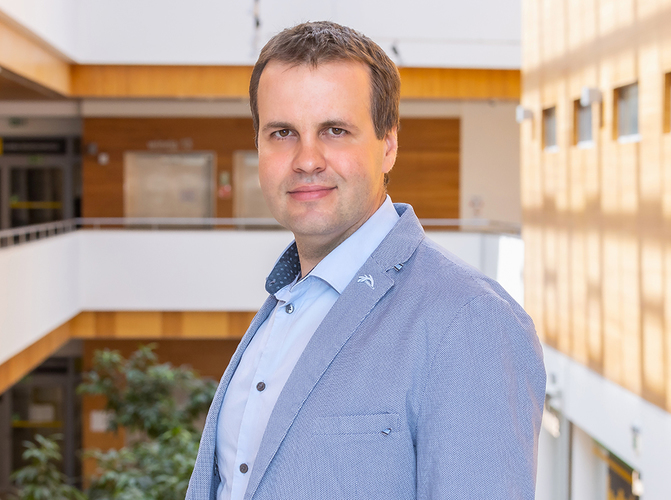Grant for an advanced respiratory disorders diagnostics project
8.11.2024
A team led by Assoc. Prof. Dr. Habil. Marcin Gruszecki from the Medical University of Gdańsk, has been recognised as one of the winners in the OPUS research grant competition held by the National Science Centre. The project, undertaken by researchers, focuses on applying machine learning and physiological elements in medical diagnostics to study respiratory disorders.
The project led by Prof. Marcin Gruszecki focuses on the development of advanced computational methods for analysing oscillations in biological systems, aiming to improve understanding of the pathophysiology of cardiovascular and respiratory diseases. Machine learning techniques will be utilized to analyse biological signals, including automated modelling of dynamic systems. Individual oscillators – such as the cardiovascular and respiratory systems – and their interactions, such as coupling phenomena, will be modelled. Additionally, predictive clustering methods will be applied to group study participants in a way that individuals in the same cluster are more similar to each other than to those in different clusters. Multi-target regression will also be used to evaluate relationships between the dependent variable and one or more independent variables. These techniques aim to identify significant clinical cases and correlate oscillator characteristics and their couplings with specific clinical states and features. All machine learning methods employed in the project are intended to produce interpretable models.
The proposed methodology will be used for medical diagnosis and physiological assessment in the context of respiratory disorders. Data will be collected from both patients and healthy individuals, covering physiological evaluations through clinical tests (e.g., cardiopulmonary exercise testing) and continuous recordings of selected signals such as electrocardiograms, blood pressure, and respiratory patterns. The analysis of oscillators and their couplings will be performed on the collected signals using time-frequency analysis and system modelling techniques. Predictive clustering will help identify groups with similar phenotypes of respiratory disorders, while multi-target regression will be applied to link disease phenotypes with the properties of the collected signals. The machine learning methods applied in the analysis are expected to yield new insights beneficial to medical science and crucial for diagnosing and treating respiratory and cardiovascular disorders.
The project will be conducted by researchers at the Medical University of Gdańsk in collaboration with a partner from the Jožef Stefan Institute in Ljubljana. The Polish team has access to a large group of patients with respiratory disorders, with study participants selected from the patients of the Department of Hypertension & Diabetology, led by Prof. Krzysztof Narkiewicz, and the Division of Rehabilitation Medicine at the Medical University of Gdańsk. Additionally, the project will be supported by Prof. Dominika Szalewska from the Division of Rehabilitation Medicine and Beata Graff, Ph.D. from the Department of Hypertension & Diabetology. The leader of the Slovenian team, Prof. Džeroski, is a respected authority in machine learning and has extensive experience in various aspects of this field, including process modelling and predictive clustering, both essential to the project. Both teams – Polish and Slovenian – bring together distinguished experts from different disciplines, facilitating the effective combination of their expertise to enhance the diagnosis and classification of respiratory disorders.
Assoc. Prof. Dr. Habil. Marcin Gruszecki earned his master’s degree in theoretical physics in 2005 and a Ph.D. in physical sciences in 2009 at Maria Curie-Skłodowska University in Lublin. From 2009 to 2011, he completed a postdoctoral fellowship at the University of Warwick, funded by the Royal Society of London. Since 2013, he has been with the Medical University of Gdańsk and, since 2019, also with the Gdańsk University of Technology. In 2018, he obtained his habilitation in health sciences at the Medical University of Gdańsk. Prof. Gruszecki has participated in numerous projects in astrophysics, molecular simulations, and biomedical data analysis. He also has extensive international experience from various research fellowships in Germany (Max Planck Institute), the UK (University of Warwick, Lancaster University, St Andrews University), France (CEA Saclay), the USA (Stanford University), Canada (University of Regina), Macedonia (St. Cyril and Methodius University), and Japan (RIKEN BioResource Research Centre).
Photo: Paweł Sudara
Archives
- Academic Year 2024/2025
- Academic Year 2023/2024
- Academic Year 2022/2023
- Academic Year 2021/2022
- Academic Year 2020/2021
- Academic Year 2019/2020
- Academic Year 2018/2019
- Academic Year 2017/2018
- Academic Year 2016/2017
- Academic Year 2015/2016
- Academic Year 2014/2015
- Academic Year 2013/2014
- Academic Year 2012/2013
